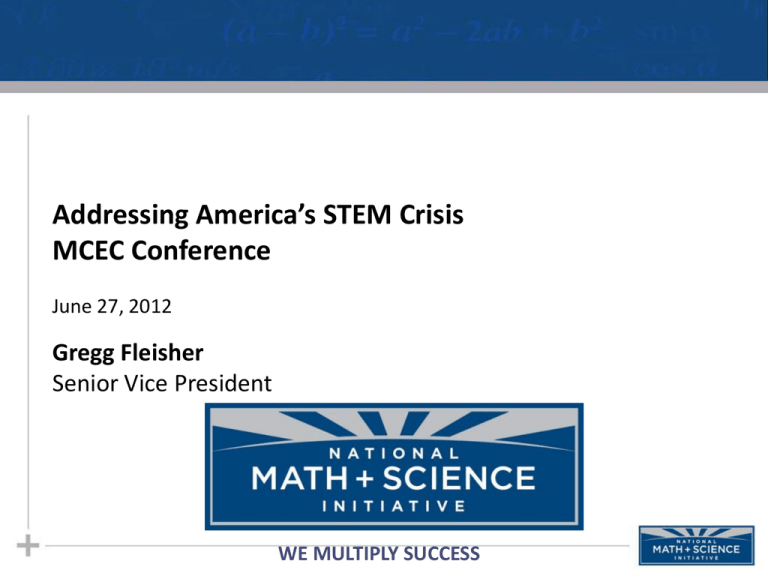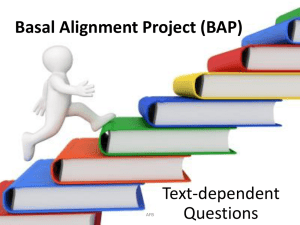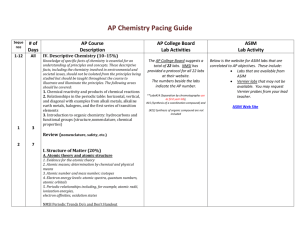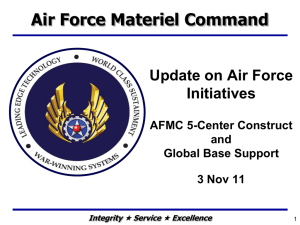APTIP Elements of Success - Military Child Education Coalition
advertisement

Addressing America’s STEM Crisis MCEC Conference June 27, 2012 Gregg Fleisher Senior Vice President WE MULTIPLY SUCCESS National Math and Science Initiative NMSI’s Mission: • The National Math and Science Initiative is an agent of change that prepares today’s students for success in the STEM-focused workforce of tomorrow. NMSI’s Approach: • NMSI takes proven programs that work within the existing school framework to improve the quality of instruction that teachers provide to students, as demonstrated through quantifiable results. 2 Advanced Placement Training and Incentive Program The Advanced Placement Training and Incentive Program (APTIP) is a comprehensive approach that increases teacher effectiveness and student achievement through training, teacher and student support, vertical teaming, open enrollment, and incentives. Elements of Success The program increases dramatically the number of students taking and passing AP math, science, and English exams, and expands access to traditionally underrepresented students. U.S. Department of Education Secretary Arne Duncan highlighted NMSI’s APTIP program and student achievement: “…schools in the new National Math and Science Initiative on AP are great examples of the power of quality instruction, more time spent on task, and rigorous, content-focused teacher training. The NMSI schools are having phenomenal success in raising AP scores among minority students. In the single year of implementation to date, the number of African-American and Latino students who scored a 3 or higher on AP exams in math, science, and English, jumped more than 70 percent.” – Secretary of Education Arne Duncan, July 15, 2010, College Board AP Conference 3 APTIP Elements of Success: The Breakdown 4 1. Extra training for teachers 2. Expert resources 3. More time on task for students 4. Financial incentives for students, teachers, and administrators 5. Measurement and accountability APTIP Elements of Success: Extra Training for Teachers AP Teacher Summer Institute (APSI) Training: • AP Teachers attend either College Board-sponsored APSIs or NMSI hosts its own APSI with College Board-sponsored consultants. This 5-day training session is conducted prior to the first year of the program and in subsequent summers during the program years. Two-Day Conferences in the fall for AP teachers: • AP Teachers attend either the College Board 2-day teacher trainings or NMSI’s 2-day training with College Board-sponsored consultants. Training for pre-AP teachers: • NMSI provides funding for the state non-profit partners to train pre-AP teachers, and those organizations choose the most appropriate pre-AP training service provider for their needs (i.e., The College Board or Laying The Foundation). Support of AP teachers: • The most unique feature of APTIP is the constant support provided to program AP Teachers by content experts. These experts monitor AP Teachers and assist them with model lessons throughout the year in order to ensure that each teacher is providing the sequencing and rigor that is need to achieve results. Saturday Student Study Sessions: • This extra time on task for students over three Saturdays per AP subject also serves as exceptional training for teachers because those teachers see experts conduct lessons for their own students. 5 APTIP Elements of Success: Expert Resources Access to the most current and effective materials • Instructive materials include AP Course information, AP Exam information, teaching resource materials, curriculum modules, articles and monographs (e.g. “For the classroom” articles, “Resources for teaching,” etc.), pre-AP articles Online resources • The NMSI Teacher Portal: Each subject has a separate section with details regarding successful implementation of AP programs, targeted toward the most important information for increased achievement on AP exams, including: essay, free-response and multiple choice questions with answer guides, scoring standards, pacing guides, unit tests, notes on what to include in lessons, archives of student study sessions, training conference handouts, links to other resources, and Clicker Questions and UT Homework System • The UT Homework System: An extensive knowledge bank of over 60,000 questions and answers covering Math, Biology, Chemistry, Computer Science, and Physics that provides a user-friendly, formative assessment system that allows teachers to customize their instruction and homework assignments toward a student’s individual learning needs. It also allows students to access assignments from anywhere and get immediate feedback on the answers submitted online. UT Homework makes it easy for instructors to create assignments by drawing from an extensive list of pre-existing questions that each have numerous variations to ensure that students come up with their own unique answers. The automatic grading feature frees up more time for instructors, so they can focus on teaching and maximize individualized instruction for each student. 6 APTIP Elements of Success: More Time on Task for Students Saturday Study Sessions: • The APTIP model includes at least three AP extracurricular study sessions per subject, which are held on Saturdays and are led by state and national AP experts who conduct the teaching while the students’ school teachers observe. Thus, the Saturday sessions provide not only extra time on task for students, but teacher training as the students’ teachers observe AP experts leading the sessions. Extra Tutoring Sessions: • Students receive after-school tutoring conducted by their APTIP school teachers, at a minimum of 40 hours per teacher per year. • This tutoring is often one-on-one and is tailored to the students’ needs in each subject. 7 APTIP Elements of Success: Financial Incentives Teacher Incentives • AP teachers in math, science, and English receive $100 for each student who appears on their rosters and receives a qualifying score on the AP exam. • Teachers also receive an opportunity to earn $1,000 bonus based on certain AP exam passing thresholds for their class. • Teachers also earn $500 for attending training sessions and for the extra work they contribute because of the program. Student Incentives • AP students in math, science, and English receive $100 for each passing AP Exam. • Half of the fee for each AP math, science, and English exam is also paid for each student; the entire fee is paid for low-income students. Administrator Incentives • Administrators receive an opportunity to earn a $3,000 bonus based on the school meeting pre-determined AP exam passing thresholds in math, science, and English exams. School Incentives • Schools receive $5,000 annually, plus $25 per enrolled AP math, science, and English student for equipment. Funds are also available for teacher training and for Saturday student study sessions. 8 APTIP Elements of Success: Measurement and Accountability NMSI’s comprehensive, standardized fiscal and program management systems • NMSI conducts a thorough, initial assessment of the current AP environment at participating schools, establishes performance goals, and sets plans for meeting those goals, including ensuring that the teachers are dedicated to APTIP, and evaluating and recommending appropriate amendments to school policies (such as grading, scheduling, and course admittance policies) in order to maximize success. • During implementation, NMSI provides ongoing operational aid, including overseeing day-to-day implementation, monitoring APTIP according to NMSI’s operational milestones, and providing direct assistance to the schools. • A data reporting system provides frequent, timely feedback to program participants, partners, funders, and third parties (such as policy makers or local governments). This system is essential for performance accountability and allows NMSI to tailor its technical and programmatic assistance to guide successful implementation. 9 Increased African-American and Hispanic student achievement in the 10 DISD AP program schools. AP exams passed by African-American and Hispanic students in math, science, and English in 10 Dallas ISD incentive schools Minority passing scores are 35 times higher in 16 years in the participating DISD schools. Source: The College Board 10 NMSI Program Locations 2012 11 COHORT I RESULTS Percentage increases in scores of 3 or greater in AP math, science and English (MSE) for the U.S. and 63 Cohort 1 schools from 2008-2011. *Female percentages are for math and 12 COHORT 2 RESULTS Percentage increases in scores of 3 or greater in AP math, science and English (MSE) for the U.S. and 74 Cohort 2 schools from 2009-2011. *Female percentages are for math and 13 COHORT 3 RESULTS Percentage increases in scores of 3 or greater in AP math, science and English (MSE) for the U.S. and 91 Cohort 3 schools from 2010-2011. *Female percentages are for math and 14 Initiative for Military Families 15 Initiative for Military Families The Initiative for Military Families is a partnership between NMSI, the Military Child Education Coalition, the Military Impacted Schools Association, several branches of the Department of Defense, and various corporations and foundations to support children in America’s military families. NMSI does so by implementing the Advanced Placement Training and Incentive Program across a network of high schools serving military installations. There are 220,000 young people in the U.S. who have a parent currently deployed, and at least a million children have had a parent deployed in the last eight years. 16 Initiative for Military Families This public-private partnership addresses the national STEM need and helps military families by providing consistent, high-level STEM education to militarydependent students. NMSI started the program in fall 2010 in four schools: two in Fort Hood and two in Fort Campbell. This past year, the AP math, science and English passing scores increased in these four schools by 45 percent - almost six times the national average. AP math and science passing scores increased by 57 percent - over seven times the national average. 17 Initiative for Military Families Thanks to the partners listed below, NMSI’s Advanced Placement Training and Incentive Program (APTIP) is being implemented this year in 29 public high schools serving a high percentage of military families across 10 states. By fall 2012, NMSI will be implementing the Initiative for Military Families in 52 schools across 14 states, with the goal of ultimately reaching a network of 150 military impacted schools. O’Donnell Foundation 18 NMSI Implementation in Public Schools Serving Military Installations 19 In the Fall, 2012, NMSI will serve 52 IMF Schools COHORT 2 2 3 2 2 3 2 2 High School Virgil Grissom North Pulaski Lemoore Fountain - Fort Carson Mesa Ridge Vista Ridge Widefield Howard State AL AR CA CO CO CO CO GA Military Intallations Served Redstone Arsenal Little Rock AFB Lemoore NAS Fort Carson Schriever AFB, Peterson AFB Schriever AFB, Peterson AFB Schriever AFB, Peterson AFB Robins AFB 2 James Campbell HI Hickam AFB, Schofield Barracks, Tripler Medical Center, USCG ISG Honolulu, NCTAMS PAC 2 Leilehua HI Hickam AFB, Schofield Barracks, Tripler Medical Center, USCG ISG Honolulu, NCTAMS PAC 2 Mililani HI Hickam AFB, Schofield Barracks, Tripler Medical Center, USCG ISG Honolulu, NCTAMS PAC 2 Radford HI Hickam AFB, Schofield Barracks, Tripler Medical Center, USCG ISG Honolulu, NCTAMS PAC 3 1 1 3 3 3 2 3 3 2 3 2 3 3 North Chicago Community Christian County Hopkinsville North Hardin Aberdeen Havre De Grace E. E. Smith Alamogordo Fairborn Carl Albert Del City Eisenhower Lawton Macarthur IL KY KY KY MD MD NC NM OH OK OK OK OK OK Great Lakes NAS Fort Campbell Fort Campbell Fort Knox Aberdeen Proving Ground Aberdeen Proving Ground Fort Bragg Holloman AFB Wright-Patterson AFB Tinker AFB Tinker AFB Fort Sill Fort Sill Fort Sill COHORT 3 3 1 1 2 2 High School Midwest City Copperas Cove Ellison Harker Heights Killeen Shoemaker State OK TX TX TX TX TX Military Intallations Served Tinker AFB Fort Hood Fort Hood Fort Hood Fort Hood Fort Hood 3 Bayside VA Langley AFB, Fort Monroe, NS Norfolk, Fort Hamilton 2 3 3 2 3 2 2 2 3 2 3 3 2 3 2 3 Bethel Colonial Forge Floyd Kellam Freedom Granby Green Run Hampton Kecoughtan Maury Menchville North Stafford Norview Patriot Phoebus Salem Stafford Sr. VA VA VA VA VA VA VA VA VA VA VA VA VA VA VA VA Fort Monroe MCB Quantico Langley AFB, Fort Monroe, NS Norfolk MCB Quantico NS Norfolk Langley AFB, Fort Monroe, NS Norfolk Fort Monroe Fort Monroe NS Norfolk Langley AFB, Fort Monroe, NS Norfolk MCB Quantico NS Norfolk MCB Quantico Fort Monroe Langley AFB, Fort Monroe, NS Norfolk MCB Quantico 3 Tallwood VA Langley AFB, Fort Monroe, NS Norfolk, Fort Story 2 2 Woodbridge Woodside VA VA MCB Quantico Langley AFB, Fort Monroe, NS Norfolk 20 For more information, please contact: Gregg Fleisher Senior Vice President The National Math and Science Initiative 325 North Saint Paul Street Suite 2900 Dallas, Texas 75201 214.665.2519 gfleisher@nationalmathandscience.org










